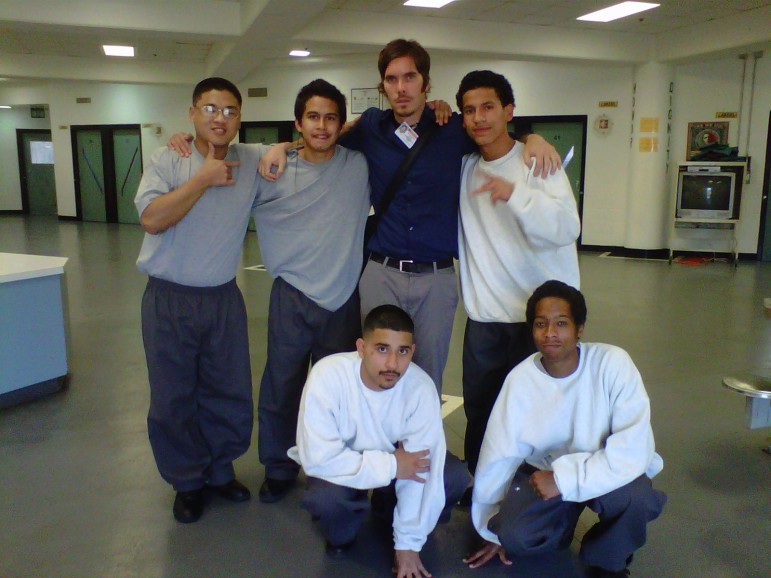
JJIE
Johnny Kovatch and former InsideOUT Writers students in 2010.
LOS ANGELES — The walls of California’s juvenile halls act as a barrier to a world most people will never experience or understand. More often than not, these halls are viewed as places of isolation and despair.
However, others, like Johnny Kovatch, see an infinite amount of potential and opportunity that can be found just on the other side of these walls.
Kovatch, a long-time juvenile justice advocate, volunteers at several of California’s most well-known juvenile halls and prisons, including Barry J. Nidorf Juvenile Hall, Ironwood State Prison and Central Juvenile Hall in Los Angeles. He first began volunteering at these institutions as a way to connect with incarcerated youth around the state.
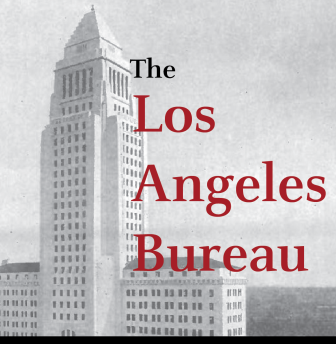 “I wanted to work with a population that was underrepresented,” Kovatch says. “These kids don’t know it but they represent truth and they represent purity.”
“I wanted to work with a population that was underrepresented,” Kovatch says. “These kids don’t know it but they represent truth and they represent purity.”
A personal tragedy in Kovatch’s own life also contributed to his desire to help reform the juvenile justice system.
“When I was in high school, my friend was murdered and robbed for $40,” Kovatch says. “I always wondered what would cause a kid to do something like that. I wondered what was missing from that life, and whether it was a parental influence, a lack of love or a lack of support that was the incentive behind it.”
Kovatch first began volunteering in juvenile detention centers as part of a program called Restorative Justice, where he provided one-on-one counseling to juvenile inmates. During his time in the halls, however, Kovatch discovered a new passion: InsideOUT Writers.
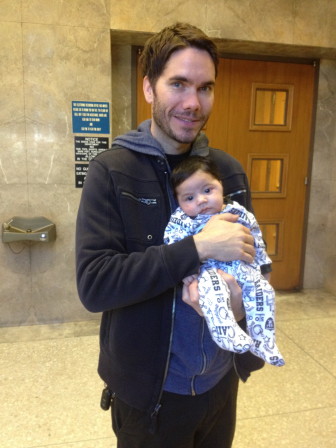
JJIE
Johnny Kovatch holding a student's son while attending his court date.
“I saw a teacher named Todd Rubenstein teaching a writing class through the glass within one of the units,” Kovatch says. “I always wondered what he was doing, and knew that I should be a part of that program.”
InsideOUT Writers is a nonprofit organization that uses creative writing to encourage personal growth and transformation within the California juvenile justice system. The organization is funded both by the county and private donors, and it ultimately aims to reduce the juvenile recidivism rates by offering a range of services to currently and formerly incarcerated youth.
The main focus of InsideOUT Writers is the Writing Program, which is open to students who are being held in various juvenile detention centers across Los Angeles County. Currently, there are 39 classes being taught each week by volunteer instructors like Kovatch.
“During my first class with InsideOUT Writers, what I discovered was that all of the students were extremely grateful that I was there,” Kovatch says. “At the end of class, every kid came up to me and said thank you, welcomed me back and asked if I would be there the following week.”
Carol Chodroff, who has been involved in juvenile justice issues for almost 20 years and is now a board member of InsideOUT Writers, has seen firsthand the positive impact that the Writing Program can have on students.
“The first time I sat in on a writing circle, I saw the kids interacting and the power of literature and poetry. I felt change happening in the room,” Chodroff says. “So many of the kids in the program have lives that are filled with sadness, obstacles, challenges and pain. Now, they have this opportunity to express themselves and to find their voices. Seeing them work together in class shows the best of the education process, the best of rehabilitation and the best of humanity, really.”
The classes and writing prompts address a wide variety of topics, but they all ultimately have one goal: to give the students the confidence to express themselves and get their thoughts and ideas out in the open.
“The biggest thing I encourage is when there’s something they feel like they don’t want to write about because it would too hard or too painful, then I tell them that’s exactly the type of stuff that they should write about,” Kovatch explains. “They write about everything. They write about how they grew up, they write about abandonment, their peers, maybe those who have been incarcerated or have died in gang related activities, and they write about wanting to have a better life.”
Participation in the Writing Program is completely voluntary, and it can often be challenging for students to first decide to attend a class.
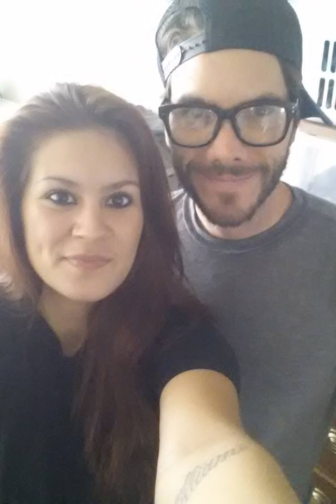
Johnny Kovatch and his former InsideOUT Writers student, Jaki Murillo.
Jaki Murillo, a former student in the Writing Program, was tried as an adult for attempted murder and robbery at the age of 15. After being found guilty, she began serving her prison sentence at Barry J. Nidorf Juvenile Hall in Sylmar, Calif. It was here that Murillo first heard about InsideOUT Writers.
“My old roommate first told me about InsideOUT Writers and she told me I should go, but I didn’t want to. I didn’t get along with the other girls and wasn’t open to new people, so I didn’t go.” Murillo says. “Instead, I used to write by myself in my room, but I would flush it down the toilet because I didn’t want people to read it.”
However, one day after a yoga class that was being held in Murillo’s unit was cancelled, she decided to finally give the writing class a shot. That was when she met Kovatch for the first time.
“From day one, the way Johnny presented himself, the way that he cared, I had never experienced something like that before,” Murillo said. “He never gave up on me. He would always come up to my room and ask me to come out, and eventually I just gave in.”
Although it was not easy, Murillo slowly started to become more open with her teachers and her classmates.
“I started seeing everybody sharing and eventually you just start sharing yourself,” Murillo says. “I would write a lot about betrayal and drugs and drug addiction, and it helped me be more comfortable with myself. I went through a really deep guilt process about a lot of the things I’ve done and it really helped me heal. I was able to share with people from a whole other world and way of life.”
Kovatch continued teaching Murillo for the next year, and was constantly inspired by her both inside and outside of the classroom.
“She always showed up with a positive attitude, she was always smiling and she showed a courage and strength that inspired others to open up and be as honest and truthful as possible,” Kovatch says. “It was her vulnerability that gave others the courage to be just as vulnerable.”
Murillo’s time with InsideOUT Writers did not end once she was no longer incarcerated. Now, she is part of the organization’s Alumni Program, which aims to transition former Writing Students into productive lives once they are released. She is also getting ready to begin classes at Los Angeles Mission College this fall, and she hopes to eventually pursue a career in the film industry.
For Kovatch, Chodroff and all of the other InsideOUT Writers volunteers, it is crucial that programs like this one continue expanding to juvenile halls across the country.
“In my mind, one of the biggest issues we have as a society is that we put our emphasis on the wrong end. All of the money gets thrown into putting a Band-Aid on the problem and paying or incarceration and giving kids long sentences rather than preventing them from ending up in that situation in the first place,” Chodroff says. “InsideOUT Writers really advocates for the kid when they’re on the inside. They try to help them survive in this culture that is really counter to everything children need. When they get out, InsideOUT Writers acts as a preventive measure for a new cycle, supporting their reentry and giving them new opportunities.”
No matter where the students and alumni are at now, what Jaki Murillo and many other InsideOUT Writers will remember most are the instructors that guided them throughout their journeys.
“Johnny has a tattoo on his arm that says ‘No estás solo,’ meaning ‘You are not alone’,” Murillo says. “No matter what the struggle, he never gave up on me and he always showed up. “
These three simple words written on his arm constantly remind Kovatch’s students that they will always have someone supporting them along the way.
“I want them to remember that they have their whole lives ahead of them,” Kovatch says. “Kids are redeemable and it’s important for them to understand that why they were incarcerated doesn’t define them. They are more than what led them in there.”
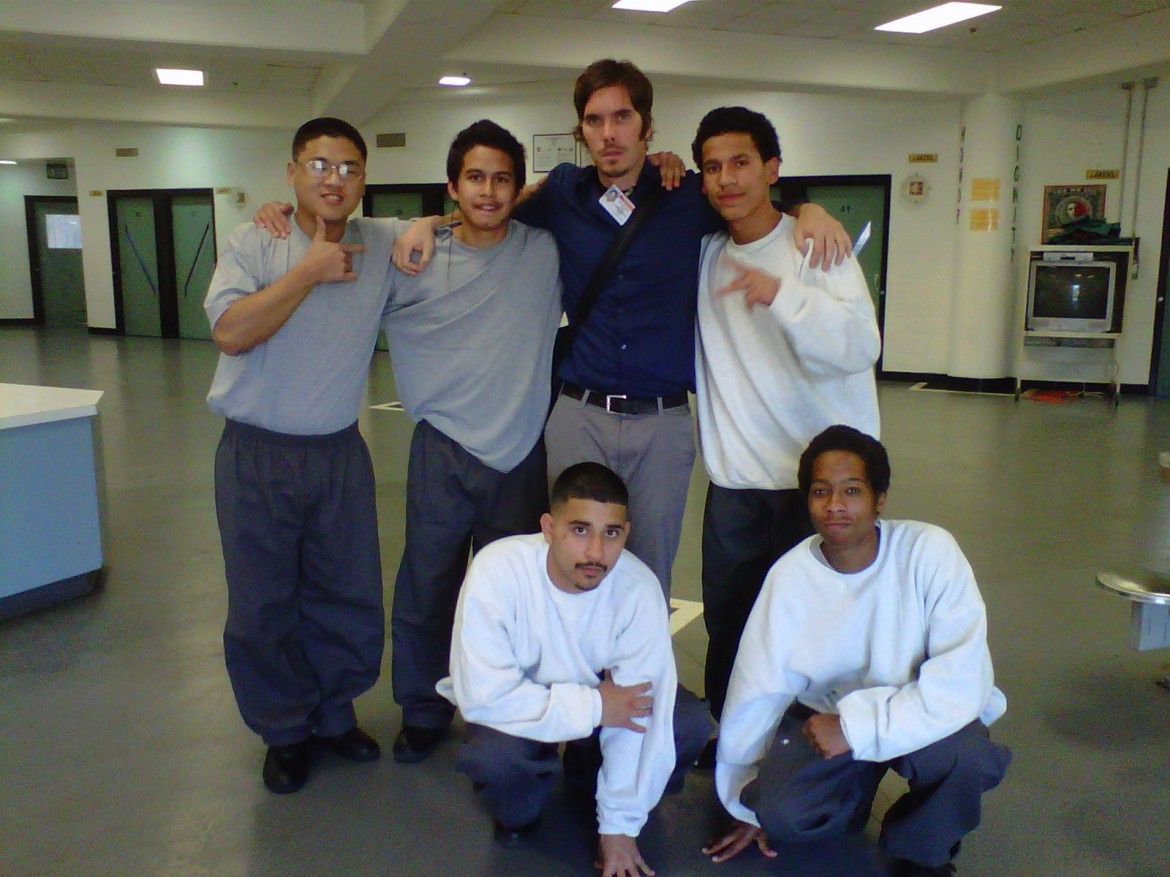

What an uplifting article!! There should be programs like this throughout the
United States. There could be if Congress passed The Youth Promise Act.